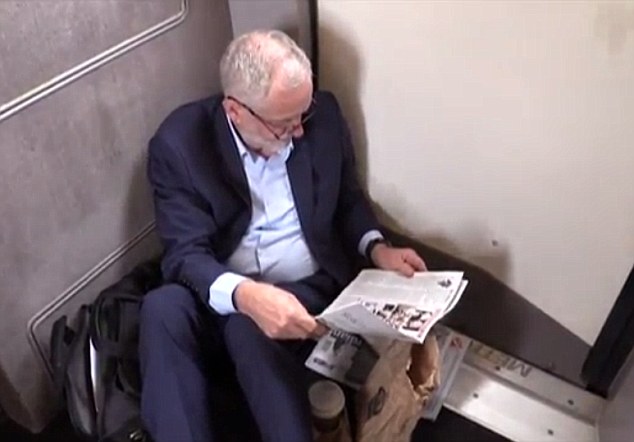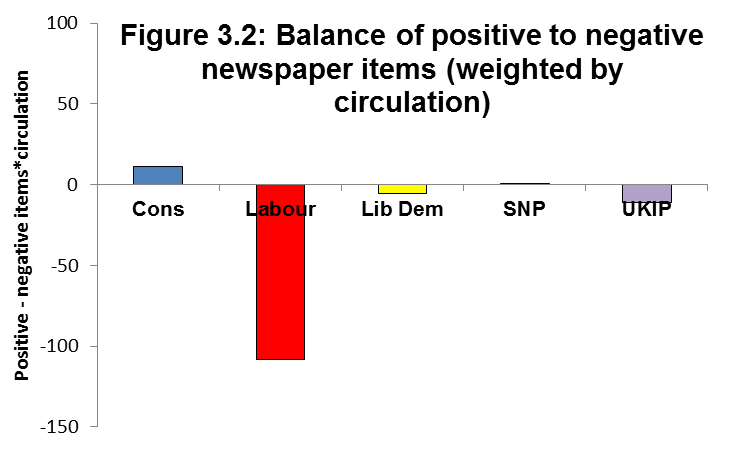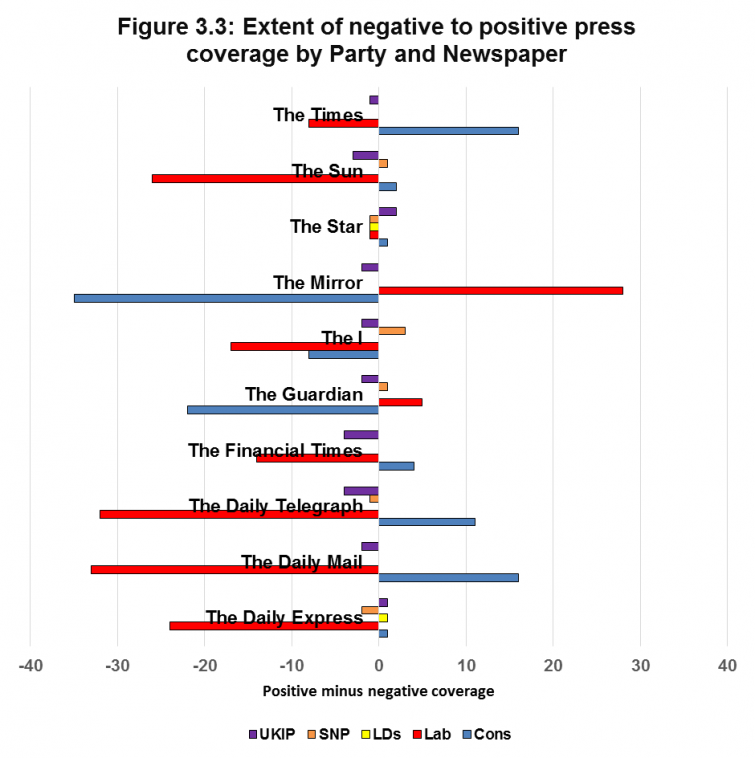
After all the elites mocking Jeremy Corbyn us unelectable:
- comparing his appointment to the head of the Labour Party as absurd as Caligula’s nomination of a horse as a consul;
- comparing him with the made emperor Caligula himself;
- to Tiberius and others;
- with Brian in the Monty Python film;
- with Tony Blair himself expressing utter bafflement how anyone could imagine Corbyn as a national leader
- with a Labour Party campaign director pleading for anyone except Corbyn to lead;
and after the intense attack on Corbyn by the mainstream media:
and
(both images from Norton and Blumenthal) . . . .
It turns out that an astonishing number of people really are acquiring a hope that a more equitable society is possible, that it really is a good idea for public utilities and national health services to be publicly owned, that free education is the right of everyone, that wars should be settled by political means. Neoliberal elites cannot understand such sentiments; and even many of the commentaries I have read on Corbyn’s dramatic success in changing the landscape of British politics seem still as bewildered as ever: Corbyn was “just a crazy populist” and those who voted for him don’t have any idea that without the neoliberal market driven provision of “goods and services” we all be doomed! People should listen more attentively to their “elitist betters”.
It’s been a long, long, wait to see such possibilities in the political landscape once again.
If you enjoyed this post, please consider donating to Vridar. Thanks!



I’m glad that Corbyn and Labour did so well.
I’m glad that Corbyn and Labour did so well, too — noting how united the opposition was against him, including a lot of members of his own Party!
Meanwhile, here in the US we are firmly locked in the grip of the neo-liberals/neo-conservatives, even with Donald Trump in the White House and granting favors to mad conservatives (like those who’ve taken over your Liberal Party).
I am surprised at what seems to be silence on the Corbyn result among a number of bloggers who normally seem keen to post on such political developments. Jerry Coyne, for one. But especially James Crossley. Crossley did earlier post about Corbyn’s parallels with the unpalatable historical hero, the Puritan: https://historicalchaos.wordpress.com/2016/07/15/corbyn-the-new-puritan/ and another on “Jeremy Corbyn Colouring Bible”: https://historicalchaos.wordpress.com/2016/01/24/the-jeremy-corbyn-colouring-bible/
I’ve seen nothing among my rss feeds to Freethought Blogs — with the notable exception of Mano Singham — or bibliobloggers commenting on the UK election results. Maybe I just don’t subscribe to the right ones. I am particularly surprised by Crossley’s silence given the political themes of several of his publications.
Ah, Ally Fogg of Freethought Blogs has come in with the goods. See https://freethoughtblogs.com/hetpat/2017/06/12/jeremy-corbyn-and-the-bonfire-of-the-cynics/
Hi Neil,
I have been a Labour supporter all my life and I am very pleased an open ended mandate was not delivered to the Conservatives by the electorate.But the issue I have is that a more electable Labour leader would have won this election.As a political party you have to be elected to change the system, securing power first has to be the aim.
Hi Leigh. Nice to see a new face commenting. Your comment reminds me of what an earlier Australian Labor Prime Minister, Gough Whitlam, said:
“Certainly the impotent are pure”, I think were his actual words.
I’d like to think that the election has presaged a change in British politics (and setting an example that can be picked up elsewhere). You think I am too optimistic?
Good to see you post on this, Leigh. It is monumental stuff, actually, coming from a such a massive disadvantage in the polls with all the corporate media and the state broadcaster against him.
Respectfully disagree with Leigh about a mythical ‘more electable’ leader. I don’t know what Leigh means by ‘electable; but it is clear that the media used the term to mean ‘friendly to big business, the corporate media and the establishment’. No, such a figure could not have made a greater advance.
We are 10% up on New Labour’s last limp effort. I was on the ground with hundreds of mostly Momentum activists canvassing in marginal seats, and without this army there would have been much less progress (no pun intended). While a few of the people I canvassed expressed reservations about Jeremy – hardly surprising considering the wall-to-wall drubbing he got in the media – nearly all of the activists I worked with were there because of him, and the change of in direction of the party.
I for one hope we have seen the last of the Blairite right running the party, and know I speak for hundreds of thousands of members of the party when I say we will never allow them to control it again.
Socialism is now back on the agenda and no-one can any longer claim it will lead to electoral ruin. Calls to abandon principles to grub onto power are shabby and unworthy. The faustian pact Blair made with the then all-powerful Rupert Murdoch is no longer necessary, and was never desirable.
Oops, my first sentence was supposed to be directed at Neil!
I unfortunately don’t know enough about Australian political history but I assume from Whitlam’s complaint that impotence alone permits purity that he was complaining about an ideological stance of the Labor Party of his time that he believed was keeping them out of office. Presumably then when he came to power he did it through some form of compromise with traditional Labor values. (Correct me if I am wrong.)
Well, if he made compromises he also introduced a revolution: free tertiary education, national health system, decent pension support, independence of foreign policy, etc. etc.
But Jesus, it was the subsequent Labor governments, especially Keating’s, that opened us up to the neoliberal assault, yes? (Hawke had appeared to be innovative with his “consensus” style of getting government, labour unions and business together — but wasn’t that like a shadow of the essence of fascism without the histrionics? — the combo of Labour and Business with the State?)
I’d like to think that Corbyn is a sign that a return to a more humane government in the interests of the whole, not primarily the business powers. It would surely be devastating if the recent results proved to be otherwise. Surely disillusionment and cynicism would be beyond recovery, then, and who knows what that might lead to.
Hi Geoff,
I was also on the ground campaigning in the early 80’s with a good friend of mine, it was not very pleasant knowing that our leader at that time Michael Foot( who was a very intelligent, caring and progressive politician) was completely unelectable. Labour has never won an election with a hard left leader, and will not in the near future. The percentage share of votes in the 2017 election was also a high for the Conservatives since the days of Margaret Thatcher, the reason for both Labour and the Tories doing so well on the share of the vote was due to the collapse of the Liberal and UKIP vote and a return to two party politics. I also want to see a government which will give hope for our young people, our pensioners and will make big business and the very wealthy pay their fair share, it will not happen under Jeremy Corbyn whether we like him or not.
Hi Leigh
You seem to be repeating the received wisdom from before the election, without adjusting it to the new evidence.
For example the post-election opinion poll showing Labour in front; the turnout from people who had not previously voted; and the trajectory of the Labour surge. Many who held your view have since publically abandoned it in the face of the new facts. The world has changed considerably since your unfortunate experience in the 80s – and we should not restrict our possibilities to those we had then. Did you predict Trump and Brexit? Perhaps these surprising events should temper confidence in the foreknowledge of future events.
Your view seems to be predicated on an assertion (“Labour has never won an election with a hard left leader”) which depends on the definition of ‘hard left’ – a pejorative media-created term. I don’t think it should be applied to Corbyn, and it evidently does not apply to the 2017 Labour manifesto which was very much in line with mainstream social democratic policy across Europe.
If you are talking about specific policies like nationalisation, you should know that these have broad support in the UK population. But it would help to define your terms.
Hi Geoff,
I actually won some money on the election of Donald Trump (betting slip to prove it) and was in the UK the week before Brexit and listening to close friends and family changed my mind and was fully expecting a very close referendum. The nationalisation of the railways, power grid, power supply (gas & electric) and public transport is well supported across the centre and left of British politics as with the public. I was at union meetings in the mid 80’s where the term ‘hard left’ had been used for many years and was, and still is accepted within the Labour party itself. The Labour manifesto included issues which Jeremy Corbyn did not support (Trident) and would need to be fully costed to entice the part of the electorate that Labour also need on board to gain a parliamentary majority. Again, I would like to make it clear that I want to see a left of centre party in power but with the UK electorate a soft left leader could win a hard left will not.
How times change. By yesterday’s standards Corbyn actually seems to me to be very “soft” left.
The perception of the public is the over riding factor, and yes, he would not be considered hard left compared to the early 80’s, but today, he is still considered hard left by the voting public.
I sometimes wonder whether any of you experienced those disastrous days during the 70’s and 80’s when the Labour party was ruled over by Militant and other Trot entryists? If people cannot learn from history then they’ll have to experience the pain all over again. God forbid!!! (oh, and by the way when I say God I mean it metaphorically)
Thatcher led the government throughout the 80s. didn’t she? Prior to her we only had Callaghan and Wilson as Labour PMs, yes?
I did state 70’s to 80’s didn’t I? You know the time, or do you possess a short memory, when Callaghan intimated ‘crisis, what crisis?’ Bodies went unburied, stinking waste went uncollected and the IMF had to bail out the sick man of Europe!!! Then we had the Labour party taken over by Militant Tendency in Liverpool where it became such a serious matter that the then leader Neil Kinnock had to get Hatton and his Revolutionary clan out of the Labour Party. Why do you think that Thatcher won a landslide election then? It was due to the power of the unions holding the UK economy to ransom. The Socialists had only themselves to blame for Thatcher. And now the Labour Party has gone full circle, only this time it’s not Militant or the Unions pulling the Labour strings but Momentum. If Corbyn ever did take power in number 10 then history will repeat itself, but not until great damage would have been done to the UK economy and our security. We’d be off to hell in a handcart and remembering that famous statement “those who do not learn history are doomed to repeat it.”
So you prefer the neoliberal agenda? Labour has always brought about chaos because they invariably yield to unreasonable workers’ demands? Only the Conservatives give good governance and protect society from the unreasonable, greedy interests of workers? Far better that the good sense and moderation and fairness of Big Business hold the power? Corbyn is no different from Callaghan? Today is no different from Callaghan’s day?
Neil, I am not a neoliberal. Labour under Callaghan did not ‘yield’ to the ‘unreasonable workers (Unions) demands’ and that is why we ended up with the winter of discontent. Conservatives do give better governance, that’s for sure when one considers more recent history. Indeed, that’s why the British people voted for Thatcher etc than for the likes of Kinnocks and Foot’s Labour parties, but don’t conflate that with only protecting society from the workers. Who are the blue collar workers today by the way? Did I state that Big Business was better. These are all strawman arguments that your are making and ones that you are making broad assumptions. Obviously I have far more in common with your Theolological/mythiscist views than with your political opinions. And it would have helped had you actually commented on what I said in my last post instead of making the wild assumptions that you did. Anyway, thanks for the little chat.
Hi Robert, I don’t know you or what your political views are apart from some brief comments here. I was asking for clarification, suggesting what your words seemed to imply to one coming from where I stand. There was no accusation at all. I was encouraging and offering you an opportunity to explain further your viewpoint for someone to whom on the surface it sounds in some ways philosophically and historically problematic. There is no need to take that as an accusation. I certainly am not looking for fights here.
I find the consequences of the neoliberal dominance of the world’s economy and political agents, the scandalous increase in the gap between rich and poor, the elitist control of information systems and general dominance of the consumerist culture, to be all so problematic and I really do long for some change to redirect societies into what I would consider more humane and civil options.
Point taken regarding the clarification you sought. However, as I stated to you in earlier postings neither the millionaire Corbyn or the Momentum dominated Labour Party will satisfy your wish for a more humane and civil society. One might as well whistle in a hurricane. All the best Rob.
Just for the record I am not a British citizen, don’t live in Britain, so have no personal stake in the British elections.
But I don’t see anything at all misguided in “wishing for a more humane and civil society”. That’s what we all want, isn’t it? And sometimes we are lucky enough to have it made just a little more so at certain times through our “democratic” processes.
(I don’t understand the need to resort to little poisoning of well digs (e.g. millionaire Corbyn) in such discussions unless one is more interested in arguing through knee-jerk slogans and ideology than historical and current data.)